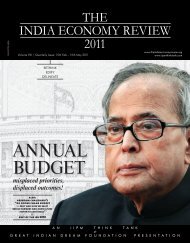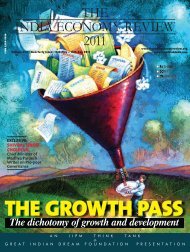Download - The India Economy Review
Download - The India Economy Review
Download - The India Economy Review
Create successful ePaper yourself
Turn your PDF publications into a flip-book with our unique Google optimized e-Paper software.
P LANNING P ARADIGM<br />
leadership in Beijing the ability to keep<br />
full democratic capitalism, and the po-<br />
litical democracy that inevitably accom-<br />
panies it, at bay for at least another<br />
generation or two.<br />
Brazil is another classic cautionary<br />
tale. Here is a nation that is the invest-<br />
ment poster-child of the Western hemisphere.<br />
Its economy is surging, its stock<br />
market up some 150 percent in the past<br />
fi ve years, having shrugged off the recessionary<br />
meltdown of its more northerly<br />
neighbors with barely a look backwards.<br />
Now, however, its state oil company<br />
Petrobras (Petroleo Brasileiro S.A.) is<br />
considering a major recapitalization,<br />
dithering to the point where major investors,<br />
like the American private equity<br />
investor George Soros, simply bailed out<br />
of its stock altogether.<br />
Finally, of course, there’s Russia — a<br />
nation, like <strong>India</strong>, of vastly disparate societies<br />
of haves and have-nots. With the end<br />
of communism came the offi cial end, at<br />
least, of state capitalism. Suddenly, all<br />
bars were removed and those with contacts,<br />
friends in high places or simply<br />
enormous energy, drive or ruthlessness<br />
(often all four combined) became enormously,<br />
unfathomably wealthy. But while<br />
the old class of wealth and power — the<br />
apparatchiki—disappeared in a fl ash, they<br />
were replaced in a heartbeat by the new<br />
class of oligarchs. Russia never has<br />
108 THE IIPM THINK TANK<br />
A thriving middle class has begun to<br />
develop, something that didn't exist<br />
in the clearly two-class communist era<br />
been in any shape a classless society—<br />
even under the religion called Marxism-<br />
Leninism, which in theory eschews all<br />
classes. It is, perhaps, a tribute to the human<br />
condition, and particularly the Russian<br />
soul, that some will succeed wonderfully<br />
and many will fail miserably.<br />
Throughout Russia’s transitionary<br />
period of true oligarchy and into the<br />
present proto-capitalist era, however, the<br />
state maintained its grip on at least some<br />
portions of the central sources of wealth.<br />
Oil, of course, remains paramount in this<br />
respect and when private oil companies<br />
— or their oligarchs — overstepped their<br />
political bounds, or failed to pay proper<br />
obeisance to the ruling elite, they found<br />
themselves quickly knocked back down<br />
to size, or shipped off to Siberia as the<br />
case may be (witness Yukos head Mikhail<br />
Khodorkovsky).<br />
Today, in full hybrid fl ower, however,<br />
the nation and its key fi nancial<br />
engines are fl ourishing.<br />
Stock and bond markets<br />
are strong. Foreign companies still<br />
clamor to invest or, having invested do<br />
their utmost to maintain their small<br />
slices that are never a controlling stake,<br />
in major Russian conglomerates where<br />
the state still maintains its majority<br />
control. A thriving middle class has<br />
begun to develop — a phenomenon that<br />
never existed in the clearly two-class<br />
communist era. In short, this system is<br />
working, quite admirably, at least for<br />
the moment.<br />
None of this is to suggest, however,<br />
that such a hybrid of state- and democratic-capitalism<br />
can’t exist all but indefi<br />
nitely. Clearly for the Russian people<br />
it works. Since the time of Ivan the Ter-





